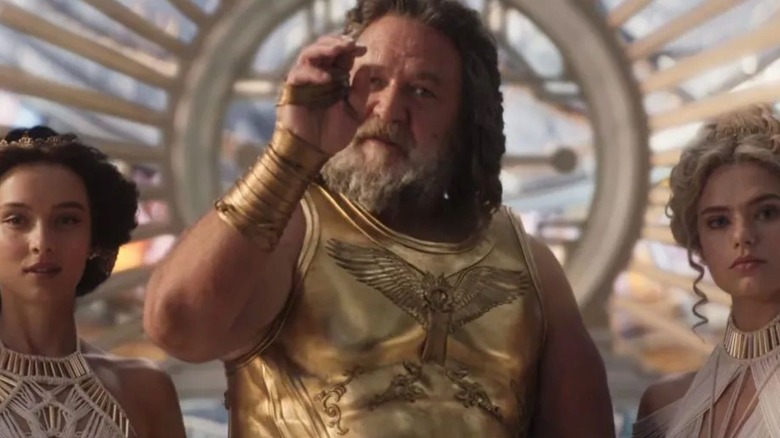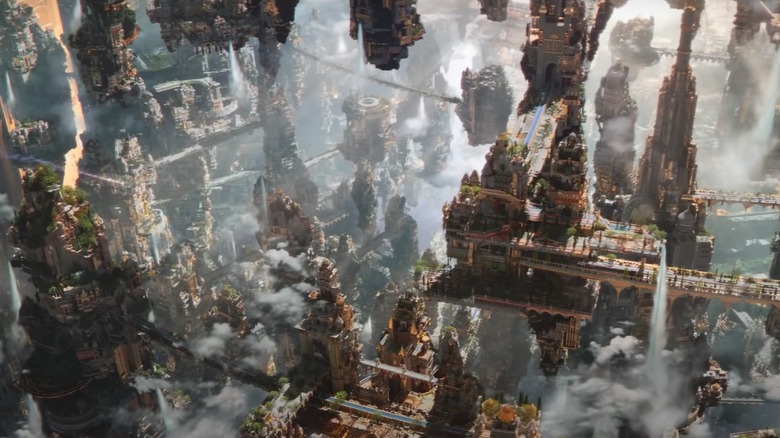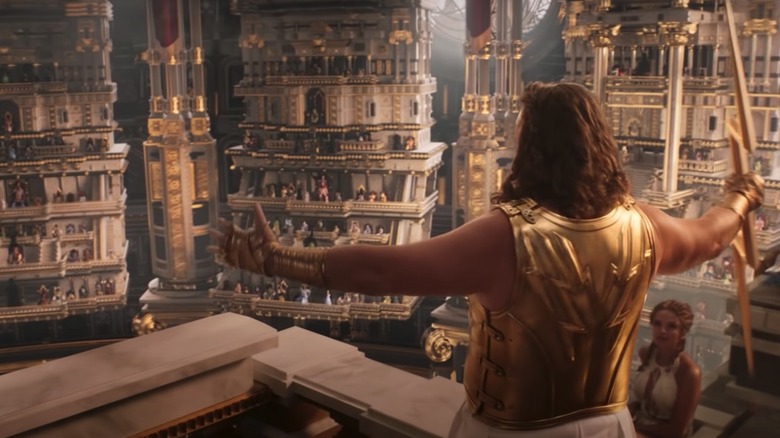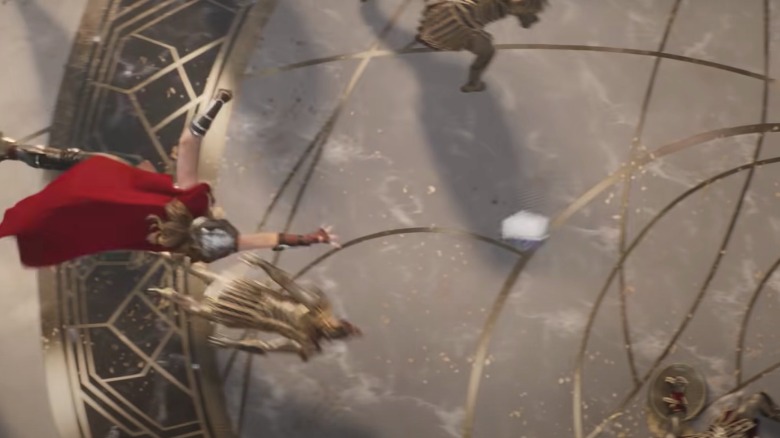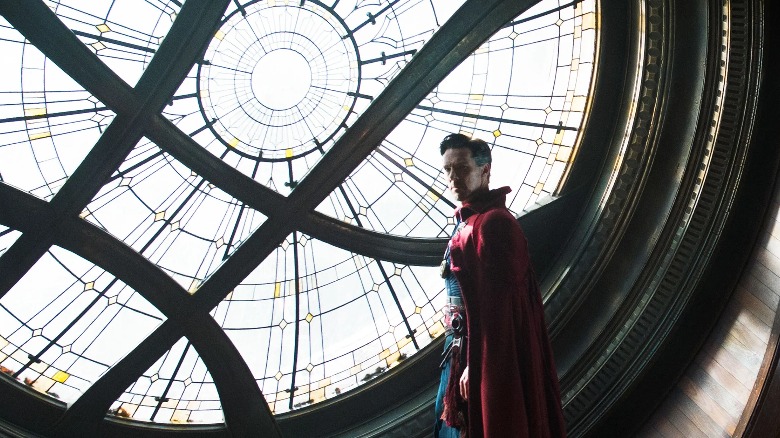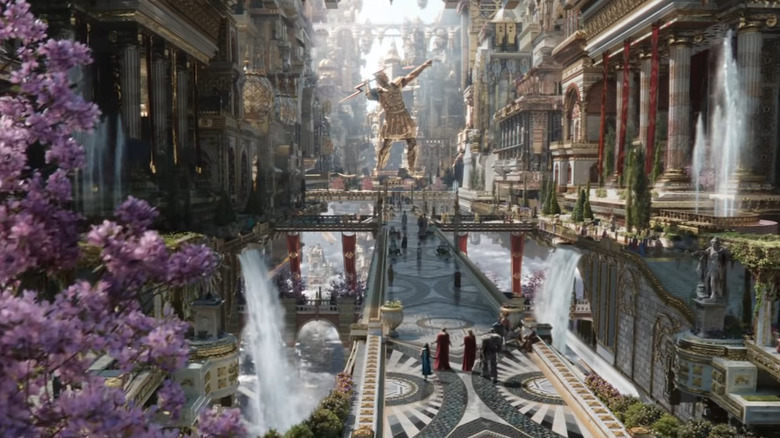What Is Omnipotence City In Thor: Love And Thunder? The Home Of The Marvel Gods Explained
The Norse, Egyptian, and Wakandan gods are not the only ones in the MCU. With "Thor: Love and Thunder," we're being introduced to a whole lot more deities including Zeus (Russell Crowe) and his pantheon. Zeus is a cheeky god, at one point flicking the clothes right off of Thor (Chris Hemsworth). He sits on a flying throne room/dias/platform thing in a stadium full of gods from around the universe, in a floating city packed with celestial forms. (That's lowercase celestials, not the ones we saw in "Eternals.") They're ranked by size, and seem to have no issue with what Gorr the God Butcher (Christian Bale) is doing to their fellows who don't dwell in Omnipotence City.
Yes, there is a city of the gods, and it's not just the top of Mount Olympus where the Greek gods used to dwell in mythology. It's a safe haven for deities who may or may not care about the people they rule over. That's sort of Gorr's whole thing. He believes the gods don't care about the people, and in the comics, they let his wife and child die. Now he wants revenge.
Spoilers for "Thor: Love and Thunder" below.
Take me down to Omnipotence City
Omnipotence City isn't really a city at all. It's a sprawling complex that is absolutely massive. In the comics, it includes the Genesis Bazaar, which is sort of a shopping market for the gods. It's also got the Halls of All-Knowing, which houses the history of the gods and is basically a library, with a spot for the gods who are lost to history and have been forgotten. It's got the Parliament of Pantheons, which is a gathering of gods for events, and presumably lawmaking. It appears that it is, though it isn't named in the film where the scene with Zeus happens.
This all appeared in Jason Aaron's comic book run, with the city itself premiering in "Thor: God of Thunder" #3. It was listed as being created 12 billion years ago, but later mentioned as being created 4 billion years ago. Numbers are just silly when they get that big. These aren't just Earth gods, of course. They're from all over the cosmos.
Parliament of Pantheons
In the comics, the Librarian who runs the Halls of All-Knowing doesn't like Thor, having met him as a bratty child. Thor wants to look at the Hall of the Lost, which lists those gods who are gone, and to discover if Gorr the God Butcher has murdered them. He's been killing for a long time, far longer than he has in the film. The Librarian tells him there is a 200-year waiting list to get into Parliament, though that doesn't exactly work for a film. We know our heroes get in, and the scene there is really great, and not just because Thor gets his clothes flicked off.
The version of Omnipotence City in the film (in the Parliament scene) also has a giant symbol on the floor below Zeus's floating platform, and one on the wall behind it. This image is from the trailer.
It's not the same as the symbol in the window of the Sanctum Sanctorum of Doctor Strange, but it has the same sort of curving motif. I have no idea if that means anything, or it's just a design choice, but I wanted to throw that out there in case any of you have theories. Could it be nothing more than magic symbolism, or is there some sort of connection?
Omnipotence City in Thor: Love and Thunder
In the film, Thor, Jane Foster aka Mighty Thor (Natalie Portman), Korg (Taika Waititi), and Valkyrie (Tessa Thompson) visit Omnipotence City in the hopes of getting Zeus and his fellow gods to help them take down Gorr. The gang dresses in disguise as the gods — don't ask Valkyrie what happened to the actual gods who wore them — and head into the Parliament. They're seated among hundreds of gods in varying sizes, their importance shown by their height, as one sees in Egyptian carvings. We've got everyone from the Egyptian and Wakandan god Bast (Akosia Sabet), to the Mayan god of wind and rain, Quetzalcóatl, to everyone's favorite, Bao, the god of dumplings.
Thor steps in front of the master of ceremonies, Zeus, who Thor thinks of as his hero, and asks him for an army to help fight Gorr, but Zeus is really all talk. Not only does he refuse and flick the clothes right off of Thor, but he completely dismisses his concerns. He thinks they'll be safe in Omnipotence City, where all the gods have been offered refuge. Zeus sics his warriors on Thor and friends, who have to battle their way out of the city. Poor Korg's body is destroyed and he ends up with his head tied to the back of Valkyrie's hair.
We may end up seeing Omnipotence City again though, considering the mid-credits scene. Zeus isn't very happy with Thor, who made him look like a chump, and Valkyrie who stole his lightning. He gives a little speech to his son Hercules (Brett Goldstein), telling him to take down Thor. This is going to open up a whole new area of the MCU, hopefully bringing in more gods and mythical heroes.
"Thor: Love and Thunder" is now in theaters.
